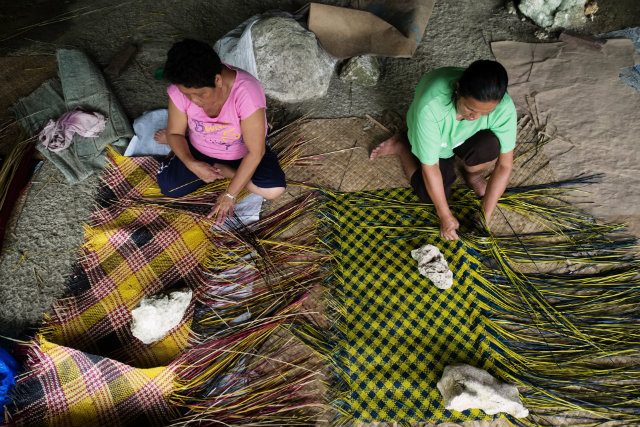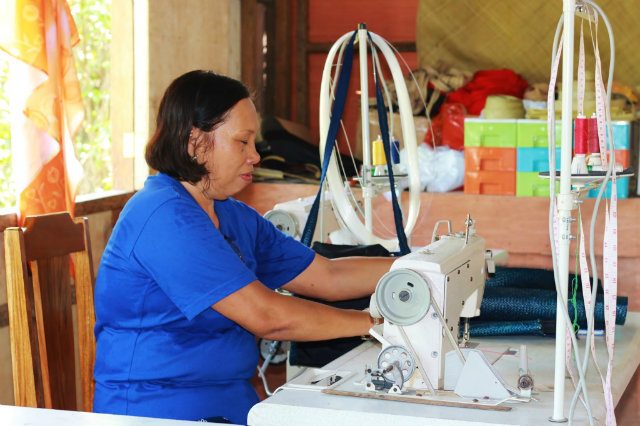SUMMARY
This is AI generated summarization, which may have errors. For context, always refer to the full article.

MANILA, Philippines – The town of Basey in Western Samar is known for its colourful and unique “tikog” handicrafts. Tikog is a native reed plant used as a raw material for mat weaving in the town.
Tikog stems are gathered from the wild and bleached under the sun for several days. Once dried, the weavers start to intricately make mats, bags, pouches, storage boxes and other crafts.
Most of the laborious activities to produce these handicrafts are done by women.
Basey, an hour’s drive northeast of Tacloban City, is one of the most heavily affected areas by Super Typhoon Yolanda (Haiyan) in December 2013. Because of its geographic location near the sea, the town’s villages are prone to storm surges and flashfloods. (READ: Storm Surge 101: Are you at risk? Are you prepared for it?)
Yolanda had a significant impact on the tikog handicraft production as Basey was flooded with salt water coming from the sea. This destroyed the tikog growing in the wild, and it left the soil not suitable for immediate tikog farming. Moreover, in the homes and work areas for mat weaving, all materials and inputs were either lost or damaged.
The women and their families gathered whatever tikog was left in the wild and could be used for mat weaving. There are 51 villages in Basey. Some 29 of which have local women associations involved in handicraft making.
BANIG, tikog and women
All associations are members of the Basey Association for Native Industry Growth (BANIG) led by Anita Ogrimen. Out of this, 13 have been supported by CARE Philippines as of May 2015.
CARE, an international humanitarian agency committed to defending dignity and fighting poverty by empowering women and girls, has provided financial assistance and trainings on productivity, business planning, and marketing for the women involved in handicraft making.
“It was a big challenge for all women weavers of Basey to continue their interrupted livelihood activities. Most of them lost their houses because of Haiyan and had to rebuild from what was left and given by humanitarian organizations. Some children were also forced to stop schooling because their parents lack money,” said Ogrimen.
“Tikog plants in the wild are also affected and we had difficulty in getting our raw materials,” she added.
Ogrimen sees the burden being carried by the women weavers. A weaver usually finishes a family-size tikog mat in 3 days but is only able to sell it at a low price.
“Some private traders are buying the finished products at a very low price. And these traders are selling the handicrafts double or triple the original price in Manila or somewhere,” she disclosed. “Obviously, the women are deprived of what they truly deserve.”
Ogrimen believes that if these women weavers are empowered to negotiate and market, they will be able to get more income.

The weavers’ husbands take part in activities that require physical strength such as plowing and land preparation for tikog farming. For them, processing the tikog which requires bundling, counting the strands, drying, segregating the tikog by colors and size, weaving, mat embroidering, and marketing are too tedious, time consuming, and requires more dainty hands.
Hence, men prefer to leave these activities to the women. They do, however, help in dyeing the tikog because it requires a lot of strength to mix the tikog with the boiling dye solution and, consequently, lift the tikog from the boiling dye solution and hang them to dry.
Women are mostly in tikog processing, mat weaving, and marketing. The women’s work time is much longer, from 10 to 14 hours a day on the average. The responsibility and labor of producing tikog mats and related products rests on the women.
Upon waking up at 4 or 5 in the morning, women continue weaving. They do this for one or two hours, while they boil water for breakfast. Then by 6 or 7 AM, they do household chores such as cooking breakfast, washing dishes, cleaning the house, doing the laundry, and preparing kids for school. By 10, they are back to weaving until noontime when they prepare for lunch.
In the afternoon, they weave some more until dinner time. Their work time goes uninterrupted if there are older children at home who can do their home chores. In the evening, they are weaving again until midnight, especially if there are orders to deliver. They stay late at night as long as they can physically make it.
Disaster-resilient economy
CARE aims to help the BANIG and the rest of women associations to develop a competitive tikog industry to help uplift their status from marginalized workers into highly skilled and enterprising beneficiaries. This is for the economic growth of these disaster-resilient communities in an ecologically balanced environment.
CARE and BANIG will be establishing production areas in Basey to ensure a steady supply of the raw material requirement of the industry. A rehabilitation of a display area will be done to serve as a promotion and market outlet of the products to support Basey’s tourism industry.
Product diversification is also being promoted to the weavers. CARE will be conducting skills upgrading training to also try maximizing the use of other native materials such as rattan and buri.
“We are also looking forward to improve the quality of our products. We are now participating in various marketing events and trade fairs in the region and in Manila,” said Ogrimen.
Anita said that the idea of boosting the industry through the support of various stakeholders drives the women weavers to produce high-quality products.
“Our vision is to penetrate the international market as well. Though for most weavers it is too ambitious, I told them that nothing is impossible if we will all work hard for it,” said Ogrimen. – Rappler.com
Dennis Amata works as the Information and Communications Manager for CARE Philippines.
Add a comment
How does this make you feel?
There are no comments yet. Add your comment to start the conversation.